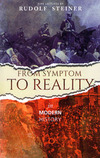
From symptom to reality. In modern history
Rudolf Steiner
Boek, Engels, 250 p. 21,5 cm. 336 gr. ill.
GA 185
Rudolf Steiner Press Forest Row 2015
ISBN: 978855844148
In these nine lectures, given in the final weeks of the First World War, Rudolf Steiner surveys some of the great developments in European consciousness and outlook since the fifteenth century that have gradually formed the Europe of the twentieth century.
He examines the rise of nationalism as it has affected different peoples and shows how profoundly a difference in religious outlook has played its part in the course of events, distinguishing between what he calls the People of the Christ in Russia, the People of the Church in Europe and the People of the Lodges in England.
He speaks personally of his own confrontation with the attitudes and movements of his time. Whilst stressing the inevitability and necessity of socialism, he makes it quite clear what has stood in the way of its true development so far.
Overall these lectures give the basis for a far deeper understanding of the present world situation and, whilst offering no suggestion of an easy path ahead, they provide insight for those concerned for the future of mankind.
1 exemplaar in de collectie
Nummer: ST.FRO.E · vindplaats: mag X.6
Aanwezig, voor online lenen of reserveren dient u eerst in te loggen
GA-informatie
Dornach, 18 oktober 1918
The birth of the Consciousness soul
Dornach, 19 oktober 1918
Symptomatology of recent centuries
Dornach, 20 oktober 1918
The historical significanse of scientific mode of thinking
Dornach, 25 oktober 1918
Characteristics of the super-sensible behind historical symptoms
Dornach, 26 oktober 1918
The Mystery of Evil
Dornach, 27 oktober 1918
Brief reflections on the publication of the new edition of 'The philosophy of Freedom'
Dornach, 1 november 1918
Incidental reflections on the occasion of the new edition of "Goethes Weltanschauung"
Dornach, 2 november 1918
Religious impulses of the fifth post-Atlantean epoch
Dornach, 3 november 1918
The relation between deeper European impulses and those of the present day
